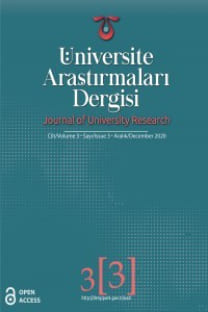Türk Yükseköğretiminde Toplumsal Katkı Kavramının Kapsamı Üzerine
Üniversitelerin toplumsal katkı açısından misyonları ve içinde bulundukları bölgedeki görevlerinin neler olduğu düşünülürse bir parçası olduğu topluma akademik katkılardan sonra sosyal, ekonomik ve beşerî-etik, etnik çeşitlilik, hümanizm vs. gibi- bazı açılardan katkı sağlamaları beklenir. Mezunlarının ileride bir parçası olacakları toplumu daha yakından tanımaları ve üniversitenin tüzel bir kişilik olarak toplumda bıraktığı izlenim ve etki, kurumun toplumdaki paydaşları ve uygulama alanları ile olan ilişkisini sağlam tutmasını sağlamakla kalmayacak aynı zamanda kabul edeceği öğrenci kitlesi ve akademisyen camiasının kalite ve etkililik seviyesini de artıracaktır. Başka bir ifade ile üniversitenin topluma maddi-manevi anlamda sağladığı katkı, bu durumun kurum adına bir “kazan-kazan” ilişkisine dönüşmesini sağlayabilir. Çalışmada, üniversitelerin “kurumsal sosyal sorumluluğu” kavramının üniversite-toplum ilişkisi ve paydaşları açısından nasıl bir önem arz ettiği, dünya genelinde bu iki unsurun sosyal sorumluluk tabanında nasıl birleştiği ve bu durumun Türkiye’deki tabloda nasıl seyrettiği gibi konulara değinilerek uygulamaya yönelik birkaç noktanın altı çizilecektir. Çalışmanın üniversitelerin kurumsal sorumluluğu ve toplum iş birliği açısından alandaki sayılı çalışmalara ek olarak global bir panorama çizmek ve Türk üniversiteleri açısından toplumsal katkı sağlamaya yönelik uygulamaların nasıl genişletilebileceğini vurgulamak adına alan yazına katkı sağlaması hedeflenmektedir.
Anahtar Kelimeler:
Üniversite Sosyal Sorumluluğu, Kurumsal Sosyal Sorumluluk, YÖKAK
An Evaluation On the Scope of the “Social Contribution in Turkish Higher Education”
Considering the missions of universities in terms of social contribution and their duties (social, economic, humanistic, etc.) in the region they are settled in, they are expected to contribute somehow in some aspects. The graduates’ getting to know the society they will be a part of in the future and also the impression and impact of the university on the society as a legal entity will not only ensure that the institution maintains its relationship with its stakeholders in the society and its fields of practice but will also increase the quality and effectiveness of the student groups and academic community it will accept. In other words, the financial and moral contribution of the university to the society can turn this situation into a “win-win” relationship for the institution. In the study, the importance of the concept of “corporate social responsibility” of universities in terms of the university-society relationship and its stakeholders, how these two elements combine in the social responsibility base around the world, and how this situation is in the table in Turkey, will be underlined over a few practical points. In addition to the limited studies in the field in terms of corporate responsibility of universities and community cooperation, it is aimed that the study will contribute to the literature in order to draw a global panorama and to emphasize how practices aimed at making social contributions can be expanded for Turkish universities.
___
- Asemah, E. S., Okpanachi, R. A., & Olumuji, E. P. (2013). Universities and corporate social responsibility performance: An implosion of the reality. African Research Review, 7(4), 195-224.
- Eren, E. (2000). İşletmelerde Stratejik Yönetim ve İşletme Politikası, İstanbul: Der. Türkiye: Beta Basım Yayım ve Dağıtım.
- Friedman, M. (2007). The social responsibility of bussiness is to increase its profits. In Corporate ethics and corporate governance (pp. 173-178). Springer, Berlin, Heidelberg.
- Kagan, C., & Diamond, J. (2019). University–Community Relations in the UK: Engaging Universities. Springer.
- Öndoğan, A. G. (2021). Kurumsal Sosyal Sorumluluğun Kurumsal İtibara Etkisi. Hiperlink eğit. ilet. yay. san. tic. ve ltd. sti..
- Karğın, M., Gökbunar, R. & Aktaş, H. (2018). Üniversitelerde Sosyal Girişimcilik: Fırsatlar Ve Öneriler. Yönetim Ve Ekonomi Dergisi, 25(1), 155-170.
- Koçak, R. D., Erden, N. K., & Aşcı, H. B. (2020 0). Kalite ve kurumsal sosyal sorumluluk bağlamında yükseköğretim kurumları. II.Uluslararası Akademik Araştırmalar Kongresi (17 - 19 Şubat 2020), Bolu, Türkiye. https://hdl.handle.net/11511/82919
- Nejati, M., Shafaei, A., Salamzadeh, Y., & Daraei, M. (2011). Corporate social responsibility and universities: A study of top 10 world universities’ websites. African Journal of Business Management, 5(2), 440-447.
- Pusser, B., Kempner, K., Marginson, S., & Ordorika, I. (Eds.). (2012). Universities and the public sphere: Knowledge creation and state-building in the era of globalization. Routledge.
- Roy, P. (2008). Urban environmental inequality and the rise of civil society: the case of Walnut Way neighborhood in Milwaukee. The University of Wisconsin-Milwaukee.
- Saran, M., Coşkun, G., İnalzorel, F., & Aksoy, Z. (2011). Üniversitelerde Sosyal Sorumluluk Bilincinin Geliştirilmesi: Ege Üniversitesi Topluma Hizmet Uygulamaları Dersi Üzerine Bir Araştırma. Journal Of Yasar University, 6(22).
- Schwartz, M. S., & Carroll, A. B. (2003). Corporate social responsibility: A three-domain approach. Business ethics quarterly, 13(4), 503-530.
- Shek, D. T., & Hollister, R. M. (2017). University social responsibility and quality of life. Springer Nature Singapore Pte Limited.
- Sliwka, A. (2004). Service learning: Verantwortung lernen in Schule und Gemeinde. Berlin: BLK.
- Soska, T., & Butterfield, A. K. J. (2013). University-community partnerships: Universities in civic engagement. Routledge.
- US Department of Housing and Urban Development. (1995). University-community partnerships: Current practices.
- Walnut Way Conservation Corporation. (2010). Caring Neighbors Make Good Communities: The Walnut Way Story Project.
- Başlangıç: 2018
- Yayıncı: Durmuş GÜNAY
Sayıdaki Diğer Makaleler
Üniversitelerin Denetim Raporlarında Yer Alan Bulguların Analizi: Karadeniz Bölgesi Örneği
Mustafa GENÇ, Ahmet YANIK, Mihriban ÖZEN
Fârâbî’nin Tümevarım Anlayışı Üzerine Bir İnceleme
Türkiye’de Yükseköğretimin Uluslararasılaşması: Tematik ve Metodolojik Bir Analiz
Free-Range Learning: The Emerging Revolution in College, Career, and Education (Kitap İncelemesi)
Türkiye’deki Devlet Üniversitelerinin İşgücü Piyasası Etkileri
Türk Akademisinde Lisansüstü Süreçlerde Yaşanan Sorunlara Bir Çözüm Önerisi Olarak Akademik Koçluk
Türk Yükseköğretiminde Toplumsal Katkı Kavramının Kapsamı Üzerine
Fen Eğitimi Yüksek Lisans Programı Öğrencilerinin Bilimsel Etiğe Yönelik Anlayışları ve Deneyimleri
